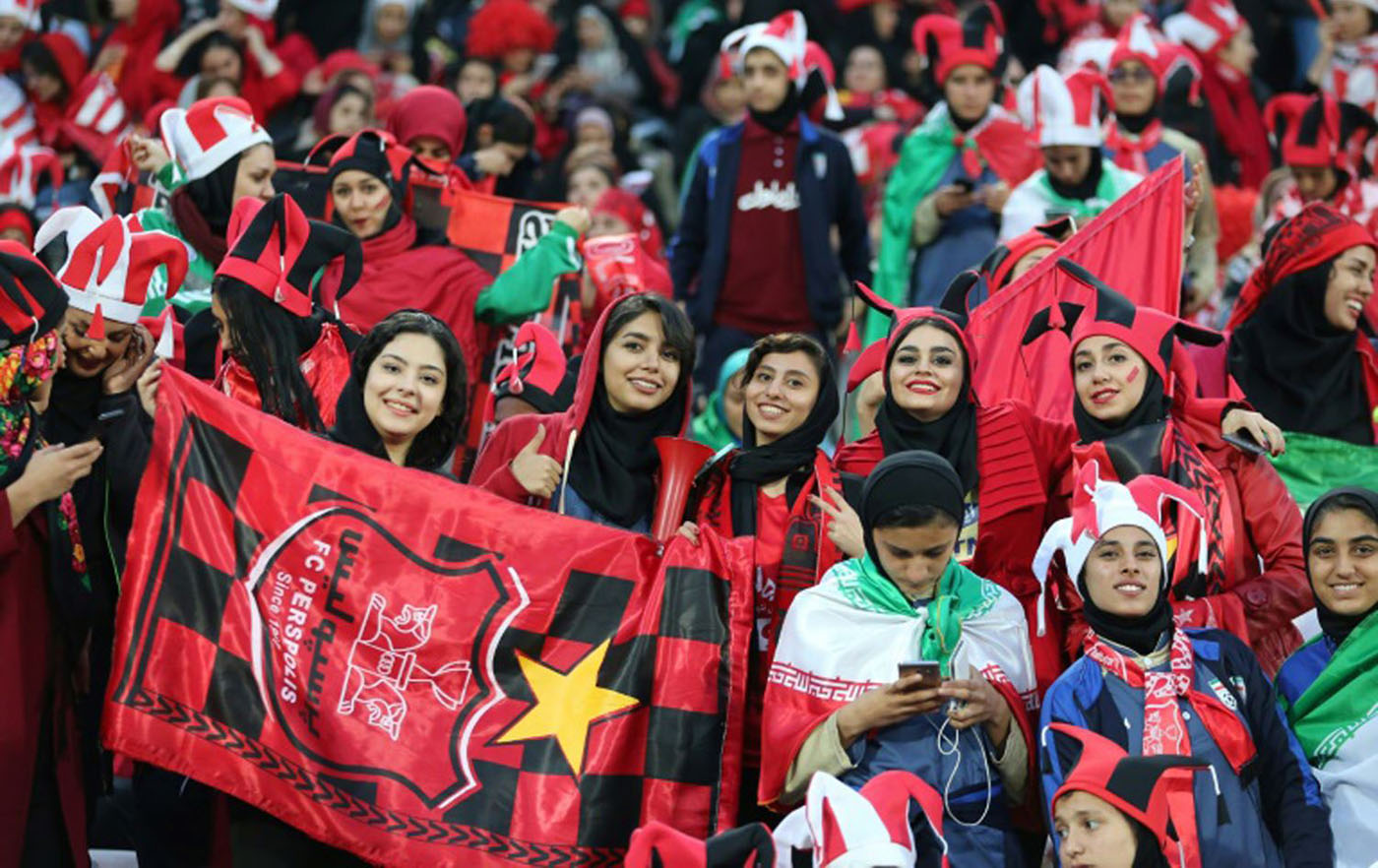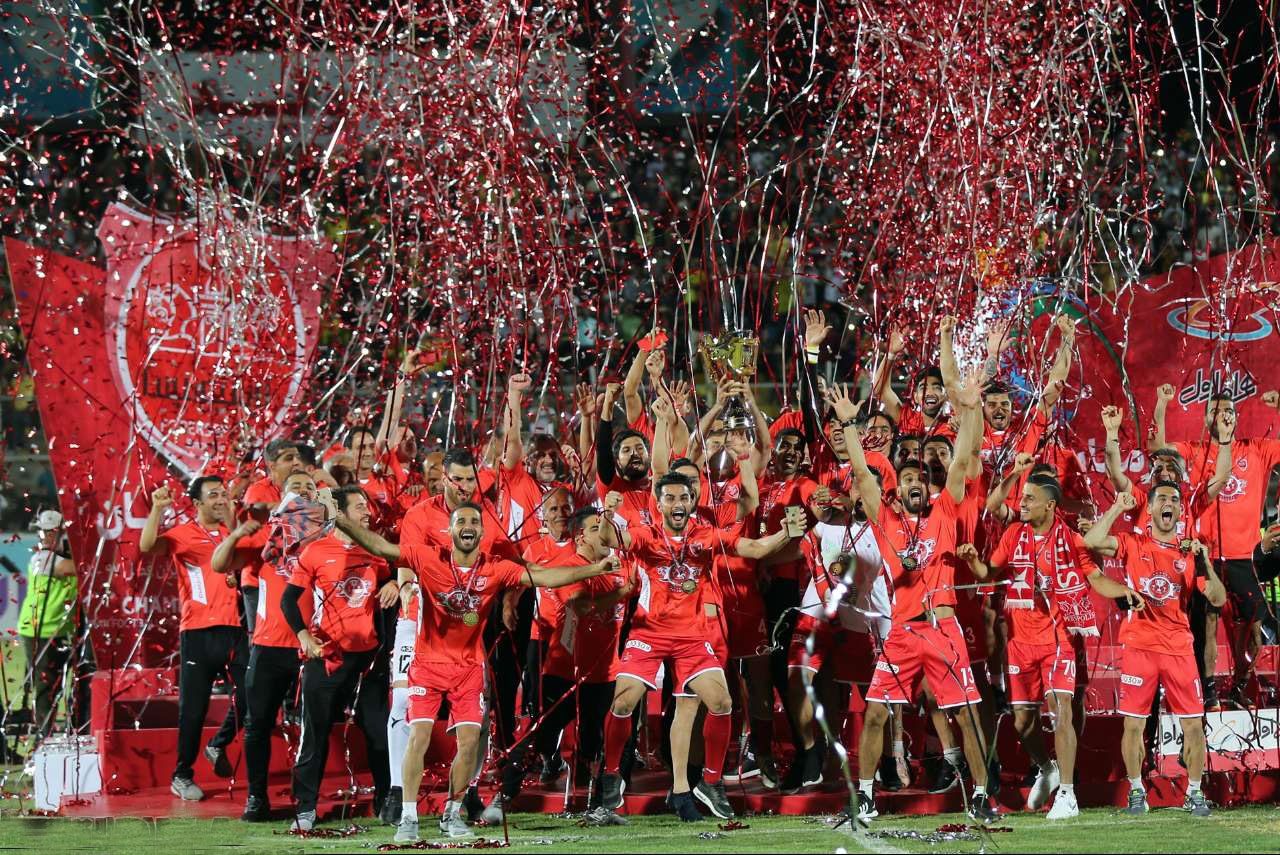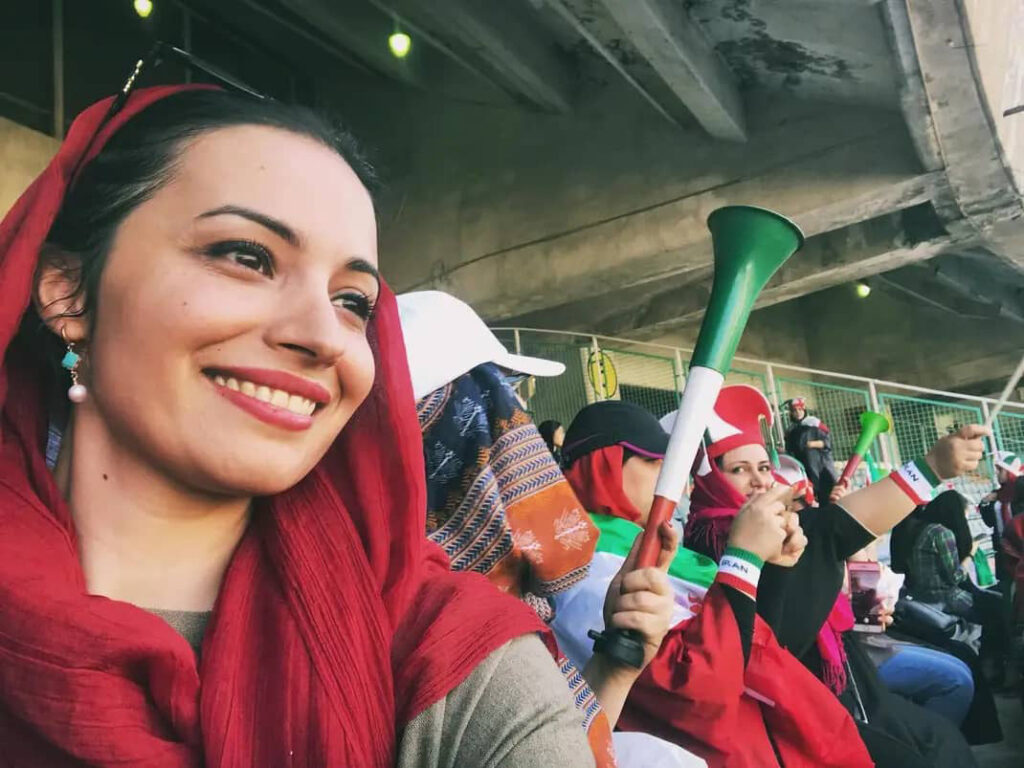
Sara Mokhavat
Translated from the Persian by Salar Abdoh
In our family, by the time a kid was five years old they’d already know if they were a supporter of the Persepolis football club or Esteghlal, Iran’s top two teams and perennial rivals at the Tehran derby. I became a Persepolis fan the day I realized my favorite uncle fixed his calendar and his daily routines around the “Red Army.” He’d been taking me to the stadium before I could even speak so he could show off the next generation of Persepolis fans to his friends. On one occasion another uncle who was a fan of Esteghlal tried to do the same. This time we were in a sea of blue, Esteghlal’s color, but I still kept screaming for Persepolis with the few words I had in my vocabulary. The uncle was mortified. He took me back home and I remained a die-hard Persepolis fan for life.
I may have been a girl, but I never backed down from a game with the boys, competing with my cousins in the backyard and playing the role of one Persepolis football star after another. But as I grew older and my body began to change I was slowly banished from the field. The dribbling days and showing the guys who was boss were over. This was of course unacceptable to me, especially now that the games were taking place not just in the backyard but on a real grass pitch with real teams. I wanted to go on wearing the number 17 of Mehdi Mahdavikia, Persepolis’ celebrated right winger whose name I’d sewn with my own hands on the back of my jersey, and hit the field. But it wasn’t to be. Apparently a football pitch was no place for a young Muslim girl who now had to wear a hijab and loose fitting clothes to hide her body.
One time I threw such a tantrum that they finally gave in and let me be goalie for a while. They figured as goalkeeper I’d have no physical contact with my male counterparts. They were wrong. I wasn’t that kind of a goalie. My role model for the position was Paraguay’s Jose Luis Chilavert, a man known to play for blood. I’d throw myself at the boys trying to dribble past me as if my life depended on it. Yet the whole time I also had an eye on my mother standing on the sidelines, looking utterly shamefaced in front of the men of her family for having raised such a rebellious daughter. At some point, a penalty was given to the other team. That same uncle who was an Esteghlal fan got behind the ball. I stood in my goal, carefully gauging his body and eye movements. I could tell he was measuring and aiming in a weird way and realized it was me he was aiming at rather than trying to score. He wanted to teach me a lesson. He kicked. I didn’t move a muscle, knowing the ball would be coming straight at me and it did. I got it right in the face. He was laughing and probably counted on me crying and leaving the field. Instead, I jumped up and down and raised my fist to show I was ready for more. My eyes and cheeks were burning from the blow I had received, but I wasn’t going to give them the pleasure of seeing me give up.
Nevertheless, five minutes later they made me leave the field anyway. I’d had my few minutes in the sun and now I had to go back to being a girl. I went and sat in a corner by myself and after a while even stopped watching the game. I was starting to believe — believe that I’d never make it to Old Trafford in Manchester or the Allianz Arena in Munich or San Siro in Milan. I’d never bring my lips to the grass in front of tens of thousands of adoring fans and I’d never be able to play in a country where football, like so much else, was a men only thing, a country where a woman hadn’t even the right to enter a stadium. I was realizing once and for all that my love affair with football had to be confined to the TV screen and remain there.
I’d stand in front of the television before every Persepolis game and as the announcer called the players’ names, I’d scream at the top of my voice. It was all that I had left. One of my girl cousins, who also had a love of football, would wait until the red flags of Persepolis draped the screen and then she’d throw herself at the television virtually kissing it. We were not just fans, but rather, we made up for the ban on our very existence by being particularly fanatical fans. This behavior made my mother doubly angry, as nothing incensed her more than a female of any age forgetting her place in the world. I was forbidden to put up posters of my favorite players on the walls of my bedroom. She’d say things like, “Possessing pictures of men is haram. And if she ever caught me with photographs of Persepolis players — it happened all the time — she’d tear them to pieces with special venom. Often I wondered if she weren’t so vengeful because she herself was a fan of Esteghlal, as was my father. When it came to football, the quarrels in our family were more than just a male/female thing; my parents actually supported the enemy team. Football had become the embodiment of everything we disagreed on, and we disagreed on just about everything.
But at our all-girls high school, I remained something of a football queen. At the start of the week the teachers would give me the tribune to speak at length about the weekend’s games, and if any Esteghlal fans tried to get a word in, they’d be hushed. One year, my cousin Mohammad who was now 17 and with whom I’d played endlessly during our younger days, decided he was going to the Tehran derby for the Persepolis-Esteghlal game. His family was against him going. But, he was a boy; he could do what he wanted. It’s not a big exaggeration to say that us girls could hardly get a drink of water without having to first ask permission, whereas boys inevitably always got their way. And so, Mohammad went and didn’t ask a second time if he could go or not. He and his friends had had a huge red flag made and on it they’d had sewn, The heart of the city of Behbahan beats for Persepolis.

Something broke in me when Mohammad went to Tehran for the derby. We’d grown up together, played together, loved Persepolis equally together, and yet where he was going was haram to me, because when it came right down to it anything that was remotely fun, anything that might bring a smile to a girl’s heart in this world seemed to always be haram. Mohammad returned from that game with a newfound pride in his eyes. He’d been to the holy grail of football in Iran, the Persepolis-Esteghlal game. And it didn’t matter if Persepolis lost that day. For months afterwards he’d go on for hours talking about what had happened at the stadium. The doors of the great derby were now open to him. And so, he went again. And again. To that magical space where the same doors were except for rare occasions almost always closed to half the population of the country.
Around that time, my cousin Mahshid joined Behbahan’s women’s indoor futsal league. I was playing basketball by then, but my heart was still with football. Futsal was nothing to me. I wanted to be outdoors, on grass, in fresh air and among a thousand fans watching while you ran from one end of the field to the other. Playing indoors felt like a joke. It was claustrophobic and never seemed real. I figured it was their way of saying, You women want to play so much, here take this indoor game and be grateful. I’d sometimes watch Mahshid who was a striker and a brilliant one at that. Her passes toward goal were always immaculate. But what use? Those elegant passes should have been witnessed in front of hundreds, thousands of people — young and old, adults and children, men and women. Instead, they didn’t even permit us to film our games so we could watch and learn from them. God forbid if a group of men got hold of the footage and saw several sweating, excited women running after a ball.
None of this was for me. I gave up. Either I’d play on a real grass pitch and with wind blowing through my hair or I was not interested. I didn’t want their hand-me-down version of football.
As time went on and I moved on to Tehran for college and afterwards, whether someone was a Persepolis fan or not usually remained a measure of our friendship. That’s how much of a fan I remained. It was, I admit, even a bit juvenile, but in retrospect I believe I was trying to make up anyway I could for having been turned away from playing the game itself.
Then it dawned on some of us that there was a way to get to Azadi stadium and watch Persepolis like a true fan. All we had to do was go as men. The trick was to wear loose clothing, put on a hat, wrap your breasts tight with bandage rolls to flatten them and have a makeup artist dab a five o’clock shadow on your face. Most of this I could do. But flatten my breasts? I don’t think so. A few of my friends went and were promptly arrested. Maybe their makeup wasn’t good enough or their breasts showed despite the bandage and the loose shirts. Then again, others went and weren’t caught. The way they described the feeling of screaming Persepolis’ name along with 50,000 adoring fans left me no choice but to try it out. I had to do this. At least once. I told myself I’d studied acting in college and my voice was naturally low. As for the breast pain, I’d put up with it for a few hours.
Azadi Stadium, get ready. I’m coming. The ground will shake from my belting out Persepolis’ name. Our red army is going to have a new soldier in the stadium at last.
But then news came that a young woman named Sahar Khodayari, an Esteghlal fan, who had gone to the stadium dressed as a man and been caught ended up committing suicide by burning herself. The fans, but really all of Iran, called her the Blue Girl after the team’s color. There was obvious sadness. For a while, teams even came on the pitch wearing black armbands. But in the end, nothing changed. Men continued to go on the field and play while other men stood and sat in the stadiums and celebrated.
I was heartbroken. I knew that if one day I were killed for the sake of Persepolis, it would be exactly the same. My death would mean nothing to the team. This love affair was one-sided — a love that I had fought to keep and for which I had been punished countless times. Persepolis was a lover who could easily go on without me and never so much as lend a second glance.

Finally, I cut the cord between us. From then on, whenever I saw an article in one of the papers about Persepolis, I’d skip past it. I stopped watching the games on television; I bottled, corked and threw away years of fandom. Yet just as I did this, something happened that opened the doors of Azadi Stadium to us women at last.
Sometime after Blue Girl’s death, FIFA put pressure on the Iranian Football Federation to allow women into stadiums. The federation had no choice but to reserve a fraction of the seats for at least one game for women. I immediately bought my ticket. The women’s seats had sold out unbelievably fast. But this was not an important game at all — Iran versus Cambodia, a lopsided match that hardly mattered and not many people would attend. Still, the sham would get FIFA off the federation’s back via a match no one really took seriously.
But the women did.
It was a once in a lifetime opportunity that we felt might finally be the first step toward having Azadi Stadium’s doors open to us permanently. We arrived laughing, screaming and holding up our flags. Mine was a Persepolis flag (I couldn’t help it). But at the gate they wouldn’t let me in with that flag. “Only Iran flags today,” they said. I didn’t have an Iran flag with me. I begged the security guy, but he wouldn’t budge.
After passing through security there was a hallway to go through to get to the seats. The crying had begun in earnest. Women were standing around waving their banners, clapping, gazing at the seating areas ahead of us and bawling their eyes out. Once we got out to the open air the weeping got louder. Women were running their hands over the seats and chanting, Blue Girl/wish you were here now. The impossible had happened for us females who loved the game. We’d finally been allowed inside Azadi. This was no small feat.
That day Iran won 14-0. Cambodia was no match for one of Asia’s powerhouses of football with national team members, many of whom regularly played in the top European leagues. We returned to our homes with hearts full of light for a change. But Iran did not keep those doors open for us. That one day had been an anomaly, the football federation’s pretense for FIFA.
Still, we had made it inside Azadi stadium, hadn’t we? It hadn’t just been our imagination, had it? For months afterwards we were telling people about that singular day in our lives — a day that in the end had little meaning, even if we didn’t want to believe it, even if there was little excitement in the reality of a throwaway match, plus the fact that I wasn’t even there to watch my beloved Persepolis. What this was, in fact, was the slightest of cracks in the steel armor of exclusion that allowed us women to breathe just for a moment before the curtains came down on us again.




Thank you Sara and Salar for sharing this story. It reveals a lot.